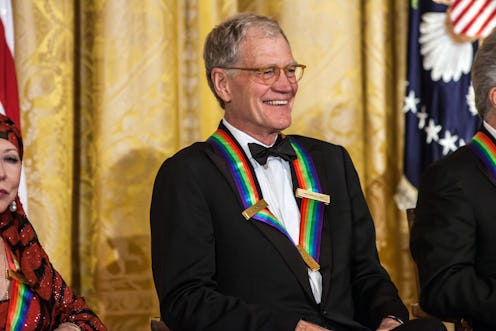News
Remembering When Letterman Made TV History
On Wednesday in New York City, David Letterman will go to work at The Late Show for the last time. He will put on a suit and sit down at his famous desk to film his final episode after hosting since 1993. No one knows what to expect, what jokes he will make, or which musical guests might appear. No one knows how his successor, Stephen Colbert, will handle the show's next chapter. A comedy dynasty is coming to a close, serenaded by chuckles, guffaws, giggles, and the occasional chortle. Those two decades on the air are preserved as the work of a hilarious humorist, one of the greats, but a somber episode stands in contrast with the jovial time Letterman had with his band and guests. One September night, David Letterman made television and comedy history by delivering a monologue about the 2001 attacks on the World Trade Center.
This speech, only about eight minutes long, inspired the country and became an acclaimed moment of talk-show history. The New York Daily News called it "one of the purest, most honest and important moments in TV history." Letterman was the first comedian to return to air after the attack, according to The Huffington Post, and earned several rounds of applause for giving the monologue that Americans needed just one week after the disaster.
"We've lost 5,000 fellow New Yorkers, and you can feel it," he said. (The death toll would later be corrected.)
Letterman said he wasn't sure he should be doing a television show, but critics seemed glad that he did. Broadcasters such as Jon Stewart and Howard Stern followed, sharing their own poignant emotional responses.
Despite his reservations, Letterman said he did the show for New York City Mayor Rudolph Giuliani, who he calls "the personification of courage." He also praises New York firefighters and police officers and encourages his audience never to take them for granted. However, Letterman, like Giuliani, will end his term to make room for the next figure.
The respect that Letterman's audience has for him, heightened in his Sept. 11 episode, is apparent as he gets ready to leave the stage for good. Jimmy Kimmel, whose show is in competition with Letterman's, decided not to air on Wednesday in order to keep the viewers focused on The Late Show. "I have too much respect for Dave to do anything that would distract viewers from watching his final show," he told The New York Times in an email. "Plus, I'll probably be crying all day, which makes it hard to work."
Letterman holds the record for longest-running late-night host in TV history. Like his greatest moments, the final show should be one to remember.
